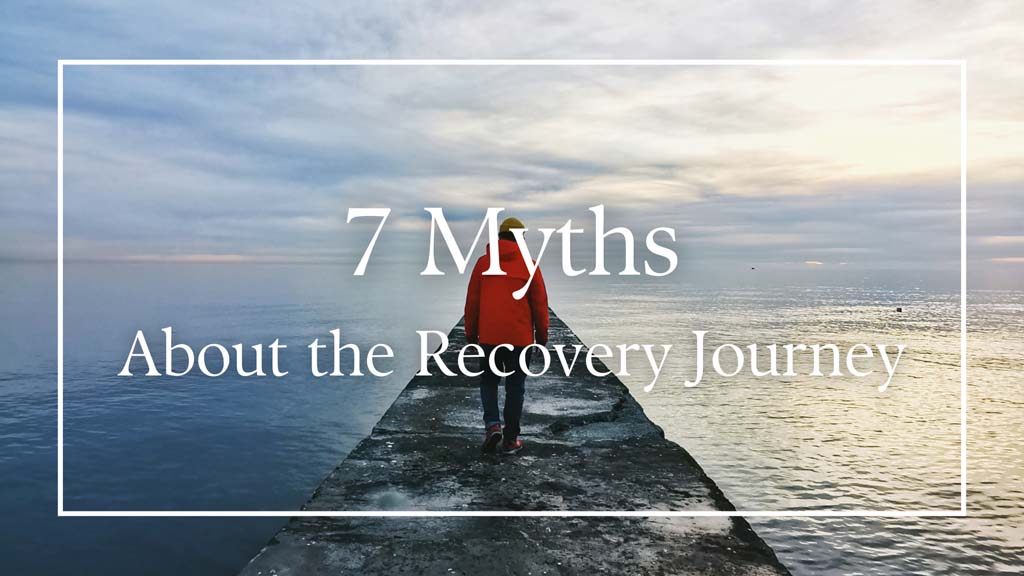Deciding to begin one’s recovery journey is one of the most difficult decisions you can encounter in life – it requires courage, strength and determination. Beginning your recovery from substance-use disorder should be a recognized and applauded feat, rather than one shrouded in shame fear. However, due to common misconceptions and fallacies surrounding the recovery process – nurtured by society’s skewed perception of substance dependency and a general sense of fear – these myths can act as obstacles or barriers to seeking well deserved help.

By exploring some of these myths further, the goal is to empower those struggling with substance-use disorder, to see through the perpetuated stigma and take the well-deserved and necessary steps towards a healthier, happier life. By attempting to understand the complexities of the recovery process and its deeply personal nature, the proper support, understanding, and compassion required for life-long recovery can be provided. Through debunking some of these myths, the hope is to create a safe and inclusive space where others feel encouraged to seek the help they deserve.
Demystifying Common Misconceptions

Myth One: Substance-Use Disorder Is A Sign Of Lacking Willpower
You may have heard that substance use disorder is a result of lacking willpower or moral character. It’s important to understand that substance-use disorders are complex conditions influenced by various factors, including genetics, environment, and personal history. Substance use alters the brain’s chemistry and affects decision-making processes. Your recovery involves much more than simply exerting willpower – it requires a multi-faceted approach that incorporates professional support, therapy, and personalized strategies. Overcoming substance use disorder is a daunting process that requires understanding and addressing the underlying causes through comprehensive treatment and a support network rather than through scrutiny and misapprehensions.
Myth Two: You Can Only Recover Once You’ve Hit “Rock-Bottom”
Recovery is not solely reserved for those who have hit rock-bottom. Substance use exists on a spectrum, and you can benefit from seeking help at any stage. Waiting for “rock-bottom” can lead to severe consequences, both physically and emotionally. Recognizing the signs of substance-use disorder and reaching out for support is a proactive approach to regaining control of your life. Early intervention and positive steps toward recovery can prevent further damage to one’s life and improve long-term recovery outcomes. Seeking help early on is a sign of strength and a commitment to one’s personal well-being.
Myth Three: It’s Best to Go It Alone and Quit Cold Turkey
Quitting substance use without professional guidance can be dangerous and ineffective for many individuals. The process of detoxification and withdrawal can be physically and emotionally challenging (if not deadly), and without proper support, the risk of returning to use increases. Seeking professional help, such as therapy, counseling, and support groups, provides a supportive environment crucial for recovery. The presence of trained professionals and a community of individuals with shared experiences can foster understanding, empathy, and growth. A personal recovery coach can offer personalized guidance and assistance using their own life experiences as reference, helping you navigate the challenges of recovery and develop effective coping mechanisms.
Myth Four: Those Working in Recovery Can’t Truly Understand

This myth is a two-part fallacy. Many are under the impression that individuals with personal experience dealing with substance use disorder are incapable of providing the proper care required for recovery. On the other front, there are individuals who feel that professionals without such lived experience are unable to understand and support those in recovery. Neither of these are true. Individuals who have overcome a substance dependency can have a significant impact on the recovery process, due to the insights and empathy unique to their experiences – this can be sense in the work completed by a personal recovery coach. Whereas, professionals working in recovery undergo specialized training and possess a deep understanding of substance use disorders and the recovery process. By integrating different types of support systems within one’s recovery process, the effectiveness and longevity of recovery increase ten-fold.
Myth Five: Medicated-Assisted Treatments Aren’t Really Recovery
Medicated-Assisted Treatments (MAT) can be a vital component of one’s recovery journey. MAT combines medications with therapy and counseling, helping you manage withdrawal symptoms and cravings that may otherwise harm the healing process. These medications, such as methadone, buprenorphine, or naltrexone, work by reducing cravings, blocking the effects of opioids on the body, and stabilizing an individual’s brain chemistry. MAT has been proven to reduce the risk of return to use, increase treatment retention, and improve overall well-being. Discrediting the stigma surrounding MAT is essential for supporting and protecting many individuals’ paths to long-term recovery.
Myth Six: There Is Only One Way To Recover
Your recovery is a highly individualized process, and there is no one-size-fits-all approach. What works for one person may not work for another. Various therapeutic modalities, such as cognitive-behavioral therapy, mindfulness-based practices, holistic approaches, and others, offer diverse pathways to recovery. It is essential to recognize that your recovery is a journey unique to you. However, many seem to believe that once treatment for substance use disorder is completed, that all recovery support ceases to exist. Personal recovery coaches play a significant role in filling the gap between treatment and solidifying one’s sense of long-time recovery. By tailoring strategies and providing guidance specific to your needs, a certified recovery coach can assist in exploring different avenues and empowering one to discover what works best form them during recovery.
Myth Seven: Life Stops Being Fun After Recovery
Another common, and easy to understand, misconception about recovery is that life becomes dull and joyless. On the contrary, recovery opens up the possibility for a fulfilling and meaningful life. By breaking free from the grip of substance use, you can rediscover your passions, develop healthy relationships, and pursue your goals. Recovery is a transformative process that brings newfound joy, purpose, and fulfillment. Personal recovery coaches provide ongoing support in building a fulfilling life after recovery, helping you navigate challenges and develop strategies for personal growth and well-being.
Exploring The Truth

Debunking common myths and misconceptions about the recovery journey is essential for supporting those struggling from substance use disorder and encourage healing process to begin. By promoting a more accurate understanding of substance use recovery, demystifying the process and addressing these fallacies head-on, we can begin to break down the barriers that prevent many from seeking the help they need and deserve. By embracing a diverse pathway to recovery, complete with individualized support and guidance, the possibilities that come with long-time recovery are endless.
As you move forward in your journey, a personal recovery coach can provide invaluable support, guidance, and accountability throughout the recovery process. At Maximum You Coaching, the expertise and personalized approach to each client’s story can make a tremendous difference in achieving and maintaining long-term recovery. Each individual’s recovery journey looks different, and so too will their healing process but with empathetic, qualified guidance you significantly increase your odds of permanent recovery. Embark on this transformative journey with Maximum You Coaching’s recovery coach and receive the tailored assistance you need and finally get back the freedom you deserve.
If you or a loved one is close to finishing or has completed substance use or mental health treatment, Maximum You Coaching can provide continued support. Send an online message for more information or call today to schedule your appointment – both in-person or telephone session available.

